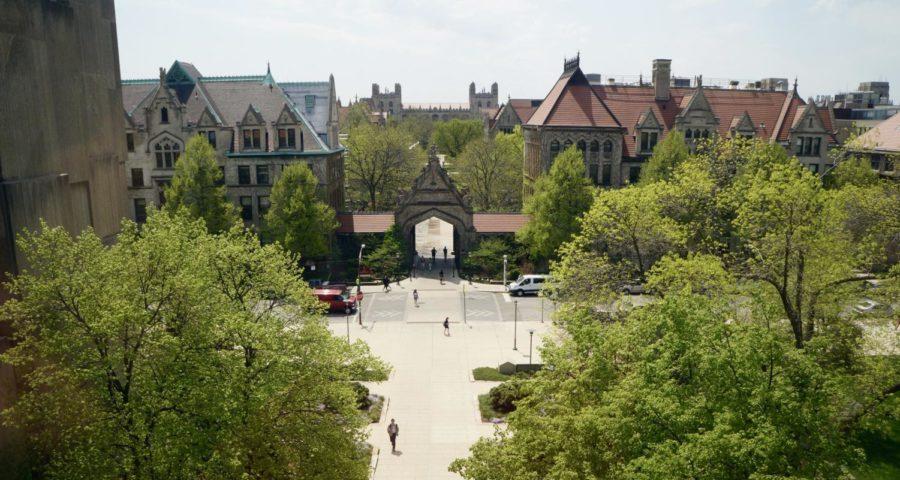Joe Maurer, a postdoctoral teaching fellow at the University who completed his Ph.D. in ethnomusicology earlier this year, has a two-year-old child. Juggling his parental and academic responsibilities was already a challenge before the pandemic hit, but COVID-19 only added to his feeling of being overwhelmed.
“We couldn’t afford full-time child care, so we paid for 20 hours a week, which was what we could afford. Even before the pandemic started, I pretty much had four hours a day to do all my work, and that was it. When the pandemic started, we couldn’t have any child care, so that was pretty tough time wise,” Maurer said.
After Maurer’s wife shifted to remote work, they would take turns watching their child for an hour while the other one caught up on work.
Student parents have a different set of needs from many of their peers: they require financial support to meet both their needs and their young children’s needs, and they balance school along with their parenting obligations. The University gives parents $2,000 a year for child care, which only covers a few months, so the government’s stimulus checks have been a huge boon to the students’ families.
Though the University and the government have given monetary assistance to student parents, there has also been an increase in student parents seeking out mental health resources during the pandemic, according to Caroline Short, director of programming at Generation Hope, a non-profit aimed at helping student parents.
Generation Hope helps student parents earn their degrees and prepares their children for kindergarten, providing support such as career services and mental health resources. According to Short, the non-profit fulfills student parents’ needs that might not have been met otherwise.
“The most common challenges that our scholars tend to face are child care, mental health, domestic violence, and housing insecurity, and I would say that all four of those have been exacerbated by the pandemic. Mental health has been challenged for many people during this really difficult time, and our scholars are no different. We’ve actually had a 30 percent uptick in requests for meetings with our mental health coordinator during this time,” Short said.
Since the start of the pandemic, Generation Hope has given out over $60,000 in additional emergency aid to student parents from its already existing emergency fund. Short mentioned that the organization has increased its push to advocate for students on college campuses by making a top 10 suggested actions list that universities should take to better support student parents, including having asynchronous classes to allow student parents greater flexibility and giving out as much emergency funding to student parents as possible.
According to Short, about 15 percent of the 110 student parents associated with Generation Hope have contracted COVID-19 during the pandemic, as have a number of their children. Short emphasized that student parents who are people of color or low income have faced a disproportionate risk of financial instability or COVID infection. A quarter of student parents who use the organization’s services lost their jobs in the first few months of the pandemic.
Student parents at the University have felt the same struggles.
A Ph.D. student with one child, who spoke to The Maroon anonymously, said that though they have fared well during the pandemic with managing their responsibilities as a student and parent, they wish the University had provided them with University-sponsored child care.
“We still have to work full time, we have to teach our classes, we have to prepare classes…but if there were some supported, sponsored, and discounted University child care, that'd be extremely helpful,” the Ph.D. student said.
Similarly, Maurer wishes that there was University-run child care available to student parents, but he also mentioned that the U.S. government could have been more helpful if it had a comprehensive child welfare system like many other countries do.
“A lot of other developed countries have child allowances. If you have a child who’s younger than school age, the government understands that it’s a substantial financial burden to either pay for child care or to forgo your own earnings to take care of that child. I think we’re the only advanced industrial economy without mandatory parental leave,” Maurer said.
UChicago’s Graduate Student Union (GSU) has also been trying to help student parents on campus get increased accommodations from the University. The University has given an additional child-care stipend to graduate student parents, but with child-care centers being closed during the pandemic, GSU believes this is not enough and has called for the University to be more flexible with graduate students’ program requirements due to the pandemic.
Laura Colaneri, GSU’s press contact, argued in an email to The Maroon that every worker has the right to have a family and that a lack of monetary and social support hinders that from happening. She said that the pandemic has created a child-care crisis, which has affected how much work graduate student parents can do.
“Parenthood is an organizing issue for GSU during the pandemic because parents should be a valued part of the academic workforce, and they have a right to support that would allow them to care for their families. If the University values the labor and situations of graduate student parents, [it] should be providing extensions and flexibility on program requirements to accommodate for this crisis, which has particularly affected women and [which] will likely impact their completion of their programs and later career trajectories,” Colaneri wrote.
Short urged people to understand that not all college students are the traditional college age so that they will be more aware of the challenges that student parents face.
“When folks think about college students, they don’t always think about student parents. And in reality, [more than] one in five undergraduates [nationwide] is actually parenting a child under the age of 18. This is not this sort of tiny, niche population, it’s actually a pretty significant chunk of undergraduate students, and when we serve student parents, they’re often at the intersection of so many marginalized identities. When we invest in these young parents, we invest in their children and their children’'s futures, so it's a really wise and important investment,” Short said.









